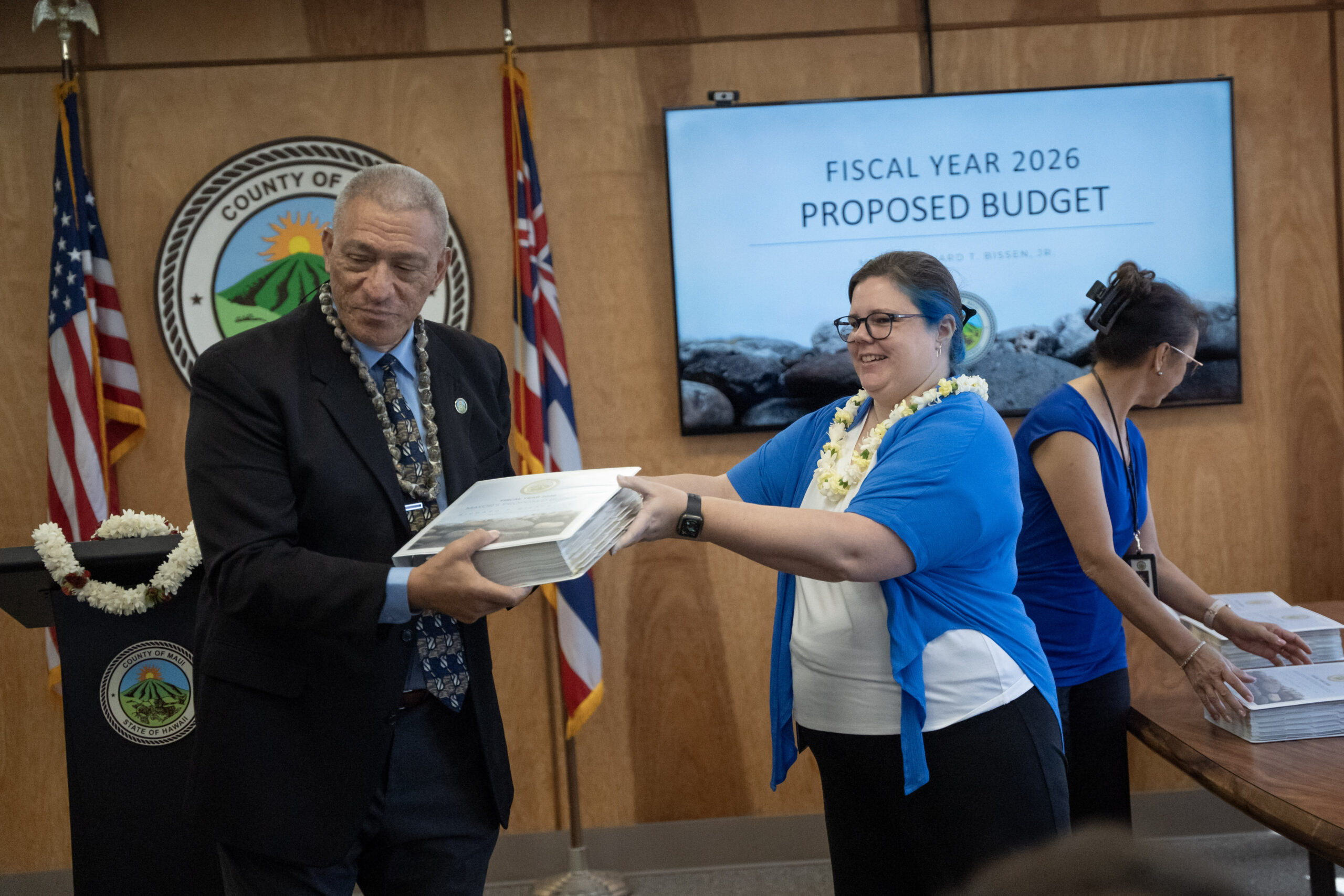 Hawai'i Journalism Initiative
Hawai'i Journalism InitiativeAs property values climb, Maui County eyes lower tax rates for resident homeowners

When Wailuku resident Michael Carr saw how much Maui County’s assessed value of his land had gone up over the past year, he couldn’t believe it.
After years of mostly moderate increases, the assessed land value of his two Old Sand Hills properties — his main home and another he rents out long term — both jumped by about $300,000, or 53%, a bigger leap than in any previous year over the past decade.
HJI Weekly Newsletter
Get more stories like these delivered straight to your inbox. Sign up for the Hawai‘i Journalism Initiative's weekly newsletter:
“It was just kind of shocking,” Carr said Wednesday.
Higher assessed values mean higher property taxes, and as homeowners like Carr brace for bigger bills, Maui County is trying to ease some of the burden by lowering property tax rates and changing who qualifies for the lowest rates.
In his proposed budget released on Tuesday, Mayor Richard Bissen said he is calling to keep real property tax rates flat across all categories except for owner-occupied homes, “where I am proposing a reduction to support local families.”
Each of the three tax tiers for owner-occupied properties would see a decrease under the mayor’s budget, which proposes going from $1.80 to $1.70 per $1,000 of assessed value in the lowest tier, $2 to $1.90 in the second-highest tier and $3.25 to $3.10 in the highest tier.
But in most cases, the tax rate reductions are a small percentage of the tax increases that come with the higher assessed values.
As an example: If an owner-occupied property was assessed $800,000 last fiscal year, the taxes with the $300,000 homestead exemption — which property owners can get for their primary residence — would be $900 at the current rate of $1.80 per $1,000 of assessed value. If that same property’s assessed value increased by $200,000 this fiscal year, even with the lower rate of $1.70, taxes would be $1,190 — a $290 increase. That means reducing the tax rate by 10 cents ultimately saved the owner $70.
The proposed budget also includes more generous tiers for owner-occupied and long-term rental properties. Before, only owner-occupied and long-term rental properties that were worth $1 million or less could access the lowest tax rate. Now, that threshold has been bumped to $1.3 million or less.

“We’ve adjusted those to try and alleviate some of the burden of the increasing assessment,” Budget Director Lesley Milner explained Tuesday. “Obviously, we can’t really alleviate 100% of it.”
The rise in property assessment rates was not the sole reason why the administration wants to keep tax rates flat, but “it was definitely a consideration,” Milner said.
Properties that are not occupied by their owners, such as vacation homes for off-island residents, would get less of a break. Currently, the highest tax rate is for properties valued at $4.5 million and above; under the mayor’s proposal, it would apply to properties valued at $3 million and above.
Maui County already has the lowest tax rates in the state for residents who live in their own homes, and some of the lowest rates across all categories.
Real property taxes, which fund public services, are the county’s largest source of revenue, and they tend to increase every year.
A decade ago, property tax revenues provided $256 million to the county. In the mayor’s proposed budget for the 2026 fiscal year, they are projected at $650.4 million, about a 154% increase.
Even as it keeps tax rates flat or slightly lower, Maui County is expecting to generate $63.8 million more in property tax revenue in the next fiscal year that it did just a year ago. The primary reason is the higher assessments.
Maui County has more than 68,000 parcels and 70,000 structures that have to be assessed annually so the county can tax the owners. The assessments are based on the market values of similar properties that have sold, and the total tax bill depends on these values as well as the tax rates set by the Maui County Council.
The latest assessments are based on all sales up until June 30, 2024, which was the last day of the fiscal year 2024, Finance Director Marcy Martin said.
When asked Tuesday if the recent hike in assessed property values this year was typical or unusual, Martin said, “it’s been increasing steadily for several years now” as interest rates also go up. The county said it has not changed the way it assesses properties, which is calculated at 100% of the fee-simple market value.
For the last fiscal year, Maui County’s net taxable value of real property was $73.3 billion, a 4.2% increase over the previous fiscal year. The county has not yet released the net taxable value of real property for the upcoming fiscal year, which will be released in mid-April.
The August 2023 wildfires, which destroyed more than 2,200 structures in Lahaina and 26 Upcountry, also has made it harder to gauge property values, particularly in West Maui, because so few properties have been sold there since the tragedy, assessors have said. However, that may change as the rebuilding of the community moves forward.
“As we get more properties back onto the market, I think maybe we’ll see a stabilization in the assessments as people rebuild or as we build new properties,” Milner said.
Homeowners who lost their properties in the fire are currently exempt from property taxes, according to county assessment notices, which were mailed out March 15.
Realtors Association of Maui data show the median price of a single-family home in Maui County was $1.3 million in 2024, up 8.5% from the previous year, though the price change varies greatly by neighborhood. The association could not be reached for comment last week.
In Carr’s Central Maui neighborhood, where most homes are owner-occupied or long-term rentals, many residents are seeing similar spikes. Carr’s main property, where he and his wife live in a 1,800-square foot single-family home with four bedrooms and two-and-a-half bathrooms, had an assessed land value of $566,000 and a building value of $251,700, for a total assessed value of $817,700 last year, county records show.
This year, the land value shot up to $866,700 — more than the entire property value in 2024 — while the building value rose to $260,900, for a total assessed value of nearly $1.13 million.
In the past decade, the property’s total value had never increased year-over-year by more than 25%, and the land value had never gone up by more than 35%.
At the property next door, where the Carrs have been renting out a 500-square-foot ‘ohana unit for the past four years and plan to demolish the aging main residence, the land values jumped from $593,000 to $908,100 with little change to the building value, increasing the total assessed value from $760,800 to $1.08 million.
“Sometimes there’s some give and take, and you can’t crush your renters, and you have to be within the market,” Carr said. “But the reality is, all of these fees and taxes are passed on directly to the renter. So if my property taxes go up on a property I’m renting, then the rent will go up on that property.”
Carr is an electrician and small business owner, and his wife is a nurse, so he said they can handle the higher taxes. But he is worried about some of his elderly neighbors, longtime residents with limited income streams.
“A hit to their budget like that, it’s just not right,” Carr said.
In North Kīhei, retiree Mike Moran has lived in the same home for 25 years, and he said this is the first time he’s ever been concerned about his property values.
“Mine jumped up quite a bit, and it made me look back to say, well, am I imagining this?” Moran said Wednesday.
Sure enough, his tax records show that his property values went up by $235,200 this year, an increase of about 33%, the largest spike in the past decade. His total assessed value for this year is $1.12 million, including $940,800 for the land and $184,100 for the building. County records show his neighbors are seeing similar increases.
Moran thought about appealing but saw it would cost him an extra fee, and given that the county might lower tax rates anyway, he decided not to.
“I have a very frugal lifestyle by choice,” Moran said. “People say, ‘What’s your favorite restaurant? And I say, ‘Oh, I don’t really go out to eat. I’m perfectly happy at home.’ I eat simple, I don’t do touristy stuff, I still ride a bike.”
Because of that, and a mortgage that’s now down to about $1,000 a month, Moran said he can afford a big one-time expense if his taxes go up. However, he’s hopeful that the mayor’s proposal to lower rates for local homeowners could help offset the higher property values.
“As an individual, that was music to my ears,” Moran said, though he said not everyone may agree given the need for funding for issues like Lahaina’s recovery and flooding in Kīhei.

Property tax revenues go into the General Fund that can be used for all county programs, explained Milner, the budget director. However, the Maui County Charter requires that at least 3% of property taxes go into the Affordable Housing Fund. The mayor’s budget this year calls for 5%, or $32.5 million. The charter also calls for 1% to go into the Open Space Fund.
Milner said this year’s budget does not take into account the mayor’s proposal to phase out about 7,000 short-term rentals because the bill hasn’t passed yet. Even if it does pass later this year, the county likely won’t see impacts until fiscal year 2027 because real property taxes aren’t paid until January, Milner pointed out.
“We’re aware of it, and we’re talking to the Department of Finance about possible impacts, but we didn’t anticipate any for this fiscal year,” Milner said.
Milner and Martin encouraged property owners to take advantage of the tax breaks that the county offers. That includes exemptions for owner-occupied properties, long-term rental homes and properties rented out long term to wildfire survivors. Owners have until Dec. 31 to apply for the exemptions.
The Maui County Council has until June to approve its version of the budget. Council Chair Alice Lee said last week that she has been hearing from “unhappy constituents” about increasing assessments, so council members will try their best not to raise property taxes at a time of economic uncertainty, since higher assessments will increase revenues for the county anyway.
Once tax rates are set by the council, the fiscal year starts July 1 and first-half-year tax bills are mailed out July 20, with a due date of Aug. 20. Second-half-year tax bills arrive Jan. 20 and are due Feb. 20.





